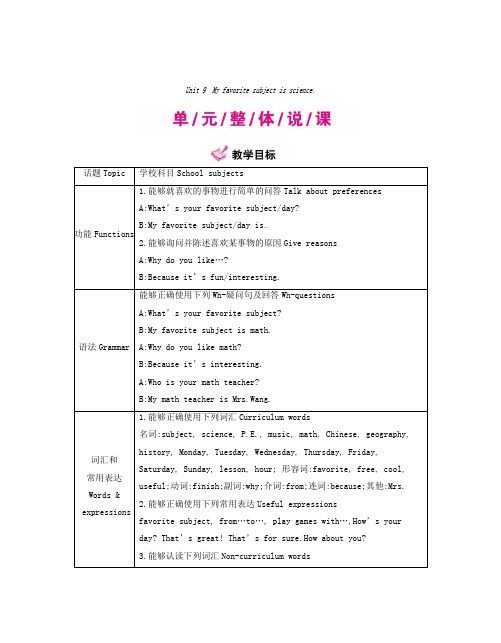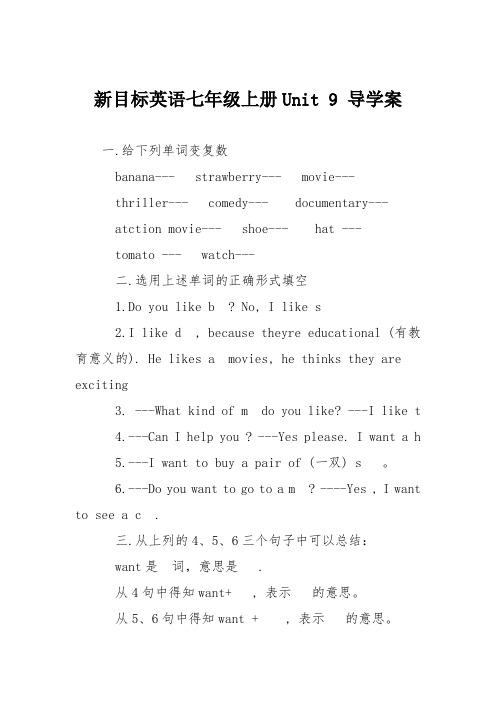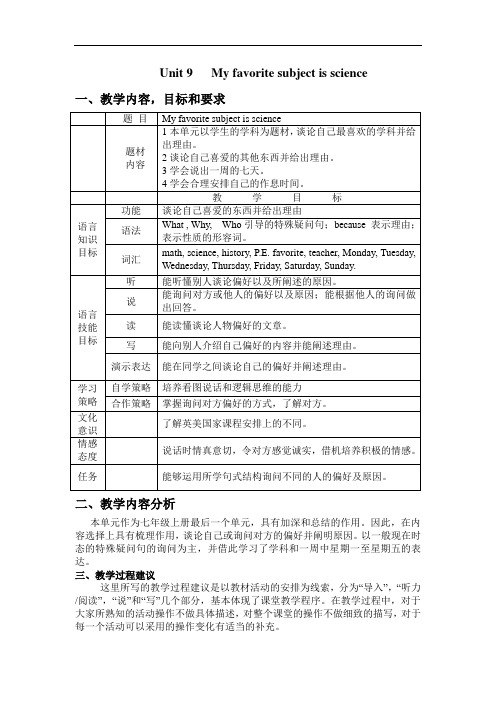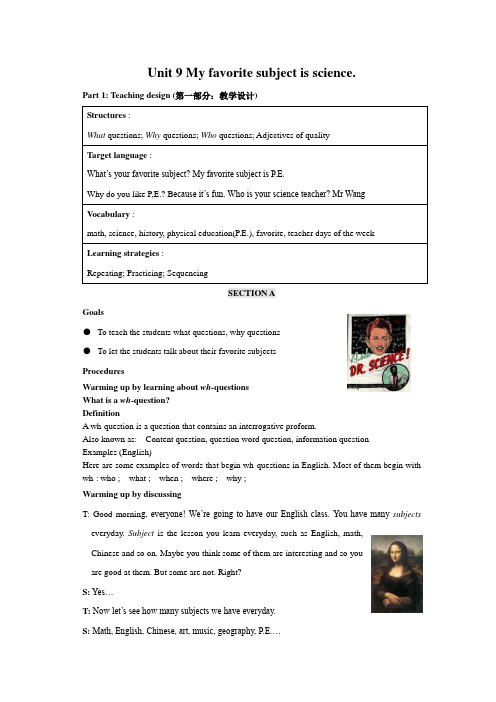新目标版七年级上册Unit9全单元学案
最新人教版新目标 七年级英语初一上册Unit 9 单元精品教案

Unit 9 My favorite subject is science.1.学会谈论自己或他人喜欢的事情并给出理由。
2.掌握who, what, why 引导的特殊疑问句及答语。
通过听力入手,符合学生的认知,再通过说和讨论等活动促使学生掌握谈论自己喜好的学科或自己喜好的其他事情并给出理由,并学会用Wh-特殊疑问句来进行口语交际。
教学突破:联系实际,创设语境,通过听说活动反复训练谈论自己喜好的学科或自己喜好的其他事情并给出理由、Wh-特殊疑问句和答语;在阅读中培养学生捕捉细节的能力;并通过写作训练引导学生学会合理地安排自己的作息时间。
注意方法与价值观的培养:以听说带动本单元的话题,在真实的语境中感知本单元的词汇和句型,培养学生良好的沟通能力。
归纳总结Wh-特殊疑问句的构成,培养学生自主学习的能力。
运用循序渐进的写作训练,写出自己一天的学习和活动安排,培养学生自我管理的意识。
第一课时:Section A 1a-1c第二课时:Section A 2a-3c第三课时:Section B 1a-2c第四课时:Section B3a-Self Check星期的由来一个星期有七天,每一天都有一个名称,说起来还有来历呢。
最早给星期中每一天命名的是古埃及人和古罗马人,他们分别以太阳、月亮和五大行星的名称作为一周七天的名称,即the day of the sun 、 the day of the moon 、 the day of the Mars(火星)、the day of the Mercury(水星) 、the day of Jupiter(木星) 、the day of Venus(金星)和 the day of the Saturn(土星)。
随着历史的发展,富有想象力的“约翰牛”(John Bull 英国人)用他们所信奉的神灵的名称来称呼星期中的每一天。
Sunday 太阳之日,Monday 月亮之日,Tuesday 战神之日,Wednesday 是根据掌管知识的文化主神Woden 的姓名来命名的,Thursday 雷神之日,Friday 是根据Woden 妻子Frigg 的姓名来命名的,Frigg 是掌管婚姻大事的女神,Saturday 农神之日,是根据掌管农业的神灵Saturn 而得名。
最新人教版新目标七年级英语上册unit9单元教案

最新人教版新目标七年级英语上册unit9单元教案Unit 9: ___ Science___:___ appreciate us subjects。
and to pursue their own ideals。
It also ___.Unit Objectives:1.Knowledge and Skills:___ us subjects.___ and learn some related adjectives.State their own ___.Ask and answer ns using different interrogative words (what。
why。
who。
when。
etc.).Learn about other students' favorite subjects。
___.Foster students' interest in science and ___.2.Process and Methods:Observe pictures。
watch videos。
listen to recordings。
engage in dialogues。
perform。
play games。
and participate in group activities.3.Attitudes and Values:Develop students' interest in science and ___.___.___:___-centered learning.___:Read more and think deeply。
participate in group cooperative learning.___:Lesson 1: n A1a-2d___:1.Knowledge and Skills:Master vocabulary: school subjects (science。
新目标英语七年级上unit9导学案

Unit 9 My favorite subject is science.第一课时Section A 1a—1c姓名:学号:一、学习目标:1.掌握词汇:school subjects: science, math, music, PE, art, Chinese, English,history2.掌握句式:—What’s your favorite subject?—My favorite subject is…3.Practicing:favorite的用法;谈论一下你最喜欢的学科。
二、预习内容:1.写出至少6个关于学科的单词2. .通过预习你能翻译下列句子吗?(1)你最喜爱的科目是什么? What’s your_________ ___________?(2)我最喜爱的科目是科学. My favorite subject _________ _________.(3)她最喜爱的科目是什么?(4)她最喜欢的学科是历史。
3.通过预习你的疑问是三、学习过程:1. Greeting and lead-in: What kind of …do you like? I like …best. And you? 引出学科单词和句式。
2.将单词与图片相匹配(1a)(新单词会读会拼并展示对话)。
A:What’s your favorite subject? B:My favorite subject is science.A:How do you spell it/science? B:S-C-I-E-N-C-E.3.听力练习:完成1b的相关内容。
Listen again,let Ss answer:What’s Anna’s favorite subject? What’s Linda’s favorite subject?4.结对活动:—What’s your favorite subject? —My favorite subject is…四、知识点拨:favorite可作名词和形容词。
新目标英语七年级上册Unit 9 导学案

新目标英语七年级上册Unit 9 导学案一.给下列单词变复数banana--- strawberry--- movie---thriller--- comedy--- documentary---atction movie--- shoe--- hat ---tomato --- watch---二.选用上述单词的正确形式填空1.Do you like b ? No, I like s2.I like d , because theyre educational (有教育意义的). He likes a movies, he thinks they are exciting3. ---What kind of m do you like? ---I like t4.---Can I help you ? ---Yes please. I want a h5.---I want to buy a pair of (一双) s 。
6.---Do you want to go to a m ? ----Yes , I want to see a c .三.从上列的4、5、6三个句子中可以总结:want是词,意思是 .从4句中得知want+ , 表示的意思。
从5、6句中得知want + , 表示的意思。
从6句中可知含有want的一般疑问句的变法: you to do sth?Heshe to do sth?巩固训练Ⅲ 填空Ⅱ W ork in groups(团结就是力量,你同意吗?) A:Do you want to go to a movie?B:Yes,I do.A:What kind of movies do you like?B:I like action movies,because theyre exciting.Report:,wants to go to a movie,he she likes action movies . Because theyre exciting.Ⅲ ExerciseNew Schem (新方案) P102 巩固训练补全对话Ⅳ Listening(2a 2b)Ⅴ PairworkMake some conversations using the information in 2bⅥ Writing(谁是写作的真“英雄”)Ben and Sally are my good friends.We all like to go to movies. We usually go to movies on weekends. BenlikesYou have to use the information in 2b and write about yourself.Ⅶ HomeworkFinish 3aUnit 9 section B (3a-3b)更多精彩推荐:初中gt;初一gt;英语gt;初一英语教案。
人教新目标英语七年级上册 Unit9 全单元导学案(无答案)

人教新目标英语七年级上册【课题】 Unit 9sectionA1a—1c ( 第一课时)【学习目标】1.熟练读出,书写本节课的表示喜好的单词以及学科的单词。
2.熟练谈论表示喜好的话题。
【重点、难点】1、表示学科的单词。
2、怎样询问对学科的喜好以及回答。
预习感知:写出下列单词学科,科目___________科学___________ 体育______ 音乐,乐曲_______数学________ 语文,汉语__________地理(学)____________历史_________特别喜爱的___________学习过程:一、掌握本课单词。
1.个人自读,记忆单词2.小组互相检查读写情况。
3.展示单词。
4.完成1a 将单词与图画匹配。
二、完成1c.---What’s your favorite subject? ---My favorite subject is art.三、听力测试。
完成1b.听录音,圈出你所听到的学科。
四.知识讲解。
(1)favorite可以做形容词,意思是___________________,前面用形容词性物主代词(my,our,your,her,his,tits,heir)或者是名词所有格(Tom’s,Helen’s),后面跟名词。
如:______(I) favorite color is red._____(she) favorite sport is ping-pong.________(they)favorite food is fruit.(2)favorite还可以做名词,放在be后面。
如:Red is my favorite.红色是我的最爱。
(3)favorite=like...best/best/如:My favorite subject is art.=I like art best. =Art is my favorite.课堂达标:一、根据句意和首字母完成句子。
人教版新目标英语七年级上第九单元教学设计

Unit 9 Do you want to go to a movie?一、教学总体设计教学内容Unit 9 Do you want to go to a movie? Section(A) (1 课时)教学目标语言知识A、学习重点词汇:movie, action movie , thriller , comedy,documentary ,kindB、掌握want 在一般现在时中的用法,及其在疑问句、肯定否定回答中的运用。
C、学习并掌握连词and 和but 的运用。
语言技能A、学会谈论自己的爱好并询问他人的爱好并说明理由。
B、在语言的运用中增强使用语言的能力。
学习策略A、通过对话练习,(谈论自己、谈论他人的爱好)巩固所学语言。
B、通过反复操练不断没置情景,在情景中进行语言练习,使学生形成语言习惯。
情感态度A、本课的话题接近于学生生活,使学生们对其感到有兴趣,通过完成各种教学任,使学生乐于叙述自己的喜好及原因。
B、使学生对英语产生兴趣,为以后的英语学习打下良好的基础。
C、在小组活动中,积极与他人合作,相互帮助,加深彼此的友谊,培养合作精神和良好的心理素质。
文化意识通过本课电影话题使学生们了解电影文化和对电影的正确喜欢,符合青少年的心理特点。
教学重点、难点通过交际中使用语言,谈论自己或他人过程中注意语言知识的正确使用。
在使用语言的过程中,逐渐形成良好的心理素质。
学生情况分析本班学生67人,对于初一学生来说,所掌握的词汇和语言知识不多,有部分学生还处于初级阶段,学生的个性心理存在着差异,所以,调动他们学习英语的积极性尤为重要。
教学评价设计要点评价工具:幻灯片,录音机、电影海报、课堂表现评价表、调查表。
评价材料:学生在课前、课中、课后的表现。
评价手段:A、运用鼓励性语言课堂随机评价评价意图:让学生在合作交流中学习语言,让他们在学习中获得成功的体验,培养他们学习英语的自信心。
二、教学过程设计教学过程教师活动学生活动评价活动设计设计意图课前评价活动Give the Ss someminutes to learn bythemselves in a groupaccording to thelanguage goals Askthe students“what do you likedoing in your freetimeListen ,thinkand answerLearn discuss通过问与答来复习以前的知识通过自学和小组学习语言目标调动学生学习英语的兴趣,导入新课锻炼自学和小组合作能力,更好地完成目标过程评价活动步骤1Teach “the newwords by usingthe posters.”Look,listen,andsay . Listenand practice.finish 1a通过电影海报介绍种类来自我评价。
人教版新目标 初一英语七年级上册Unit 9 全单元教案

Unit 9 My favorite subject is science一、教学内容,目标和要求二、教学内容分析本单元作为七年级上册最后一个单元,具有加深和总结的作用。
因此,在内容选择上具有梳理作用,谈论自己或询问对方的偏好并阐明原因。
以一般现在时态的特殊疑问句的询问为主,并借此学习了学科和一周中星期一至星期五的表达。
三、教学过程建议这里所写的教学过程建议是以教材活动的安排为线索,分为“导入”,“听力/阅读”,“说”和“写”几个部分,基本体现了课堂教学程序。
在教学过程中,对于大家所熟知的活动操作不做具体描述,对整个课堂的操作不做细致的描写,对于每一个活动可以采用的操作变化有适当的补充。
Period One课型:Listening and speaking方法: Interactive approach教学目标: 1) To understand the dialogue involving preferences and reasons2) To talk about preferences and to give reasons教具: Tape recorder, picture, handout, OHP.教学步骤:Step 1 Warming-up/Leading-in (Activities 1a )目的:本阶段活动是为下面的听力做准备,起导入话题和复习词汇和学习新词汇的作用。
建议:作为对本课堂的导入,教师可以首先谈论一下自己的偏好,引出What’s your favorite subject ? 以及回答My favorite subject is ...句型,并且结合matching 活动复习有关学科词汇和学习新词汇subject , science ,P.E。
操作:方案1:直接进行1a活动,采用教师说左边单词,学生回答所找出的右图中的图画。
然后集体练习左边的学科词汇。
方案2:如果学生的水平比较高,教师可以增加活动的难度,例如在matching活动之前展示下列问题:1)Who are they in Picture ...?2)What are they doing?3)What’s his/her favorite subject?His/Her favorite subject is...Step 2 Listening and circling (1b)1) 指着1a 中的6幅图画,让不同的学生说出每幅图所表示的学科科目,然后让学生轮流训练说出图画中的学科科目名字。
人教版新目标 初一英语七年级上册Unit 9 单元教案

Unit 9 My favorite subject is science.Part 1: Teaching design (第一部分:教学设计)SECTION AGoals●To teach the students what questions, why questions●To let the students talk about their favorite subjectsProceduresWarming up by learning about wh-questionsWhat is a wh-question?DefinitionA wh-question is a question that contains an interrogative proform.Also known as: Content question, question word question, information questionExamples (English)Here are some examples of words that begin wh-questions in English. Most of them begin with wh-: who ; what ; when ; where ; why ;Warming up by discussingT: Good mornin g, everyone! We’re going to have our English class. You have many subjects everyday. Subject is the lesson you learn everyday, such as English, math,Chinese and so on. Maybe you think some of them are interesting and so youare good at them. But some are not. Right?S:Yes…T:Now let’s see how many subjects we have everyday.S:Math, English, Chinese, art, music, geography, P.E.…T: And we have science. Science includes chemistry, physics and geography and so on.1a Matching the words with the picturesLook at the picture on page49, there are many subjects in the picture. Please match the words with picture.1b Listening and circling the subjects you hear in 1aWe have many different subjects everyday. Now let’s listen to the tape and circle the subjec ts you hear in 1a.Read the tapescript to underline the wh-question.1c.Doing pairworkI think you must have your favorite subjects. Please practice the conversationbelow. First read after me and practice it with your partner. I will ask some pair toact it out.Then make your own conversations with your partner like this:2a Listening and putting in order.Listen to the tape and please put the conversation in order. First you just listen and then put them in order. Can you try to place the sentences in right order?2b Listening and matchingYou will hear the conversation. In the conversation, people talk about school subjects. Listen and matching the subjects you hear with the description words.2cThinking and matchingNow what do you think of your subjects? You can give your opinion. You can practice this conversation first.Then you can make up your conversation with your partners and match the subjects with the description words.The answers may be like this:OK, stop! Now please make a conversation using the information in 2a.2d Role-playRead the conversation below, then practice in pairs.Afer a several minutes, I ’ll ask some of you to perform the conversation.3a Filling in the blanks.Fill in the blanks with what, who or why to complete the conversations.3b Writing questons for the answers.Use the setense partern of “what, who or why ” to complete 3b.3c Groupwork1.Ask and answer questions about your favorite subject in the class..2.Fill the chart.SECTION BGoals● To go on talking about favorite subjects● To learn the days of week and the expressions of datesProceduresWarming up by talking about the dateT: Boys and girls! Today we’re going to learn a new part Section B. By theway, what day is it today?S: It’s Tuesday.T: What’s the date today?S: It’s October 9.T:Oh! I see. Let’s open you book and turn to Page52, and learn 1a.1a MatchingLook at your book and find the opposite words for the left words:1b&1c Listening andCheckingNow listen to the tape for 3 times. The first time you have to check the words you hear in 1a. Then listen again and circle the classes David talks about on the schedule in 1c. The third time, you have to check the answers.1d Doing pairworkLook at the schedule in 1c and talk about David’s favorite subject with your partners. Then talk about your favorite subject in pairs.2a WritingThere list some subjects you have learned in school. Write a description for each one.2b Reading and circlingLet’s read the following letter. Underline the things Yu Mei likes. Circle the things she doesn’t like. While reading you should pay attention to the pronunciations and intonation and underline the expressions.2c Completing scheduleWe have read Yu Mei’s letter in 3a. here is Yu Mei’s schedule. Please complete it with the information from 3a. Then we have a clear look about what she does on that day.3a NumberingNumber these parts of an e-mail massage.3b&3c WritingI know you all have busy days. What is your favorite school day? Write your schedule for that day ,then write a e-mail massage to a friend of you.Closing down by playing a guessing gameLet’s play a guessing game.We can play it like this: One student does some actions about one of subjects. And the others guess what su bject it is. Let’s see who can guess the most subjects.SELF CHECK1 WritingWrite out the subjects you have at school and your feelings about them. Thenmake a dialogue as 1d.S2 Filling the blanksComplete the questions with what, when, who or why. Then answer thequestions.Closing down by making a lectureI think everyone has a favorite subject and has his reasons too. Let’s talk about “my favorite subject”. You have five minutes to prepare. Then stand up to give your lecture to us. You can use body language when needed.Let’s learn some names of English songs.Honkey Pokey; How Is The Weather?(天气怎么样?); I Love Little Pussy(我喜欢小猫); I’M A Little Teapot(我是一把小茶壶); If You're Happy(如果你感到快乐); Jimmy Crack Corn (撬开裂纹玉米); Jingle Bells(铃儿响叮当<1>); Jingle Bells(铃儿响叮当<2>); Lazy Mary(懒惰的玛丽); Let Everyone Clap Hands(让每一个人拍手); Let Us Sing Together (让我们一起唱歌); Little Cabin In The Wood(森林中的小木屋); Little Goldfish(小金鱼); Little Green Frog(绿色的小青蛙); Little Peter Rabbit(小兔彼得); Make New Friends (结识新朋友); My Aunt Came Back(我的姑妈回来了); My Brother And I(我的哥哥和我); Oh, Christmas Tree(哦,圣诞树); Oh, Susanna(噢,苏珊娜);Pat A Cake(做个面包); Pop!Goes The Weasel(砰!追逐鼹鼠!); Rain, Rain, Go Away(雨,雨,走开); Reuben Reuben(鲁宾); Roll That Bal(滚动那个球); Round The Clock(围着时钟转); Sally, Go' Round The Sun(萨利绕着太阳转); Sea Shells(海洋贝壳); She'll Be Comin' Round The Mountain(她将绕过这座山脉过来); Simple Simon(头脑简单的西蒙); Sing Together(一起歌唱); Six Little Ducks(六只小鸭子); Smile(微笑); Ten Fat Sausages(十根肥香肠); The Ants Go Marching(蚂蚁在行军); The Bear Went Over The Mountain(小熊上了山); The Family(家庭); The Farmer In The Dell(农夫在小山谷中); The Finger Family(手指家庭); The Months(月份); The More We Get Together(我们在一起越多)Part 2: Teaching Resources (第二部分:教学资源)I. Background readings——Time (美国人的时间观)What is time? Is it a thing to be saved or spent or wasted, like money? Or is itsomething we have no control over, like the weather? Is time the same allover the world? That's an easy question, you say. Wherever you go, a minute is60 seconds, an hour is 60 minutes, a day is 24 hours, and so forth. Well, maybe.But in America, time is more than that. Americans see time as a valuable resource. Maybe that's why they are fond of the expression, "Time is money."Because Americans believe time is a limited resource, they try to conserve and manage it. People in the U.S. often attend seminars or read books on time management. It seems they all want to organize their time better. Professionals carry around pocket planners-some in electronic form-to keep track of appointments and deadlines. People do all they can to squeeze more life out of their time. The early American hero Benjamin Franklin expressed this view best: "Do you love life? Then do not waste time, for that is the stuff life is made of."To Americans, punctuality is a way of showing respect for other people'stime. Being more than 10 minutes late to an appointment usually callsfor an apology, and maybe an explanation. People who are running lateoften call ahead to let others know of the delay. Of course, the less formal the situation, the less important it is to be exactly on time. At informal get-togethers, for example, people often arrive as much as 30 minutes past the appointed time. But they usually don't try that at work.II.Fun materials——Holes and coversOnce San Diego was badly flooded. Some residents suggested removing manhole covers to speed up the draining of rain flooded streets. That sounded a good idea. However, it made matters worse because the underground system was flooded too. Several covers became lost inknee-deep water, and police were called in to help.“we’re picked up the lost covers all right.” One officer asked headquarters. “Now how do we find the holes?”Back came the order: “That’s easy. Walk till you fall in.”III Word studies1.strict(stricter, strictest)a. 1.严格的;严谨的精确的;正确的exact; accurate: The men who make the parts of an airplane must use strict measurements. 制造飞机零件的工人必须使用精确的量具。
- 1、下载文档前请自行甄别文档内容的完整性,平台不提供额外的编辑、内容补充、找答案等附加服务。
- 2、"仅部分预览"的文档,不可在线预览部分如存在完整性等问题,可反馈申请退款(可完整预览的文档不适用该条件!)。
- 3、如文档侵犯您的权益,请联系客服反馈,我们会尽快为您处理(人工客服工作时间:9:00-18:30)。
Unit 9 Do you want to go to a movie?主备人:陈贤慧审核人:督办领导:时间:2010.12.1第1课时Section A 1a—2c学习目标:1. 熟练读出,书写并利用本课时单词.2.学会谈论自己的爱好并询问他人爱好..学习重难点:学会谈论自己的爱好并询问他人爱好.前置学习:认读并书写本课单词..写出下列单词并展示.去_________电影__________动作片__________喜剧_______________记录片__________ 恐怖电影或小说_________种类_______________去看电影____________________展示交流:1. 完成1a 将电影类型与海报匹配.2.听录音完成1a 圈出你听到的电影类型..3. 让学生理解并复述听力对话. 并和你的同学编新对话.4. 听录音完成2a和2b .5. 根据2b 表格询问Ben 和Sally喜欢的电影类型。
如:A: What kind of movies does Ben like ?B: He likes comedies and documentaries.A: Does he like thrillers ?B: No, he doesn't.A: Does he like action movies ?B: Sorry, I don't know.6. 就你和你朋友喜欢的电影类型进行自由问答。
合作探究:小组讨论单词want 的用法。
1,want +名词。
如:(1) “我想要我妈妈”这个男孩说。
“ I _______my _________" the boy said.(2) 我想要一些草莓。
___________________________________________________2, want ( sb ) + to do sth( 1) 我想去看动作片。
I want __________see ____________ movie.( 2) 他想去玩电脑。
________________________________________________达标拓展:(一)按要求写出下列单词.comedy (复数)_____________ documetary(复数)_____________________boy(复数)_________________big (反义词)__________________________long (反义词)______________ twelve(序数词)_______________________go(反义词)________________ forty- two(序数词)_____________________(二)选择1. ____________you want to go to a movie? A. Do B. Does C. are D. Is2. __________the man like comedies A. Do B. Is C. Does D. Are3. I want ________see an action movie. A. at B. in C. to D. for4. What kind of movies ___________Mike like ? A. do B. don't C. does D. is5. — Does the boy have a great sports collection ? —__________A. Yes , he doesB. No , he don'tC. Yes , he isD. No, he isn't(四)翻译下列句子.1. 你想去看电影吗? _________________________________________________________2. 我想去看记录片。
_________________________________________________________3. Jane 想去看电影吗?_________________________________________________________4.—你喜欢什么类型的电影?—我喜欢动作片和喜剧片_________________________________________________________教学评价:通过本节课的学习我最大的收获_________________________________感到自己有待加强的是________________________________________教后反思:_______________________________________________________________________________ _第2课时Unit 9Section A 3a—4学习目标:1.熟练掌握本课单词和短语.2.学习和掌握连词and和but的用法.学习重点:1.单词和短语.2.连词and和but的用法.前置学习:读写、记忆本课五个单词和一个短语并默写.1.个人自读,记忆.2.小组互相检查读、写情况.3.写出下列单词并展示.歌剧____________ 寻找;查找_________ 某人________的人___________ 学生________ 短语: 京剧______________展示交流:用and和but连接句子,表述某人对电影的喜好..1.读3a独立完成,并在小组内核对答案,小组讨论and和but的用法.and___________________________________________but___________________________________________2.利用3a图画及and和but,介绍3a中人物对电影的喜好.e.g. Maria likes thrillers but she doesn't like comedies.3.运用句型What kind of movies do you like?询问对电影的喜好,并完成表格.NamesKinds of moviesLikes and dislikesI4.利用表格内容及and和but,介绍自己及同学对电影的喜好,并写在下面的横线上。
____________________________________________________________________________________________________________________________________________________________________________________________________________________________________合作探究:思考什么时候用and,什么时候用but?并举例。
and_____________________________________________________________but_____________________________________________________________达标拓展:(一)用所给词的适当形式填空.1. I want two _____________(sweater)2. She wants ___________(go)to a movie with her friend..3. They like _______________(documentary).4.________ he want to go to a movie?Yes, he _______(do).5. I like __________(China)action movies.6. Many __________ (student)are in the room.7. The book is very_____________(interest).(二)根据句意及首字母填空..1. It's relaxing to listen to(听) m_______________2. My mother is a teacher(教师)and I am a s____________.3. W_________ are they? They are my patents4. I can't f_______ my eraser.Where is it?5.I like Beijing O_________.6. S_______ is talking with (和......交谈)your mother.Do you know her?(三)用and和but填空.1. I like tometoes ________ he doesn't.2. They are in Class 7 ________ Li Ming isn't.3. She likes documentaries_______ he doesn't.4.You, he ____I are good friends.教学评价:通过本节课的学习我最大的收获是_________________________________感到自己有待加强的是_____________________________________教后反思:_______________________________________________________________________________ _第3课时Unit 9 Section B 1—2d学习目标:1.掌握本课11个单词2.学习如何描述喜欢电影类型的理由学习重难点:表达自己喜欢和不喜欢电影的类型,及其原因前置学习熟练掌握本课的11个单词.1.个人自读,记忆本课单词.2.小组互相检查单词读写情况.3.根据汉语写出下列英语单词或短语并展示.可怕的,吓人的__________ 有趣的;好玩的___________ 悲哀的;悲伤的_____________令人激动的;振奋人心的___________ 事实上;真正的____________ 时常;常常_______认为;想;思考_________学习;学会________ 关于;涉及;在...方面_________历史__________ 与...在一起;和__________展示交流:小组合作完成1,并核对答案.练习听力1.听录音完成2a.2.再听一遍,完成2b内容.学习2c1.个人自读短文,并翻译.2.小组合作,翻译短文.3.尝试背诵短文.合作探究:(教师寄语:Many hands make light work. )小组合作翻译: 他认为他能学关于中国历史的知识.He _________he can learn about ________ ________.玛丽经常和她的妈妈去看京剧.Mary often ______ _____ _______ _________with her mother.达标拓展:(一)完成句子.1. Lily r_______(真正地)likes action movies.2. She goes to see _________(China) thrillers.3. C__________are very funny.4. Jim thinks the thrillers are s_________.5. The story is very b________.I don't like it.6.Tom likes t________but he doesn't like romances.(浪漫剧)(二)翻译短语中国功夫片___________ 京剧____________ 向...学习_____________ 中国历史___________一个让人兴奋的动作片_______________________ 一个有趣的喜剧_______________________ 一场可怕的电影________________________一个让人厌烦的记录片______________________ 一个悲哀的故事_________________________(三)选择1. He ________Beijing is very interesting.A. thinkB. thinksC. like2. Mark ______a lot about Chinese history.A. learnB. learnsC. thinkD. thinks3. —_______pictures does ben like?— He likes the pictures of Beijing Opear.A. What kindB. What kind ofC. what kindsD. What kinds of4. _______action movies are very interesting.A. ChinaB. ChineseC. The ChinaD. The Chinese(四).翻译句子.1.有关音乐方面的东西,我学到了许多。
